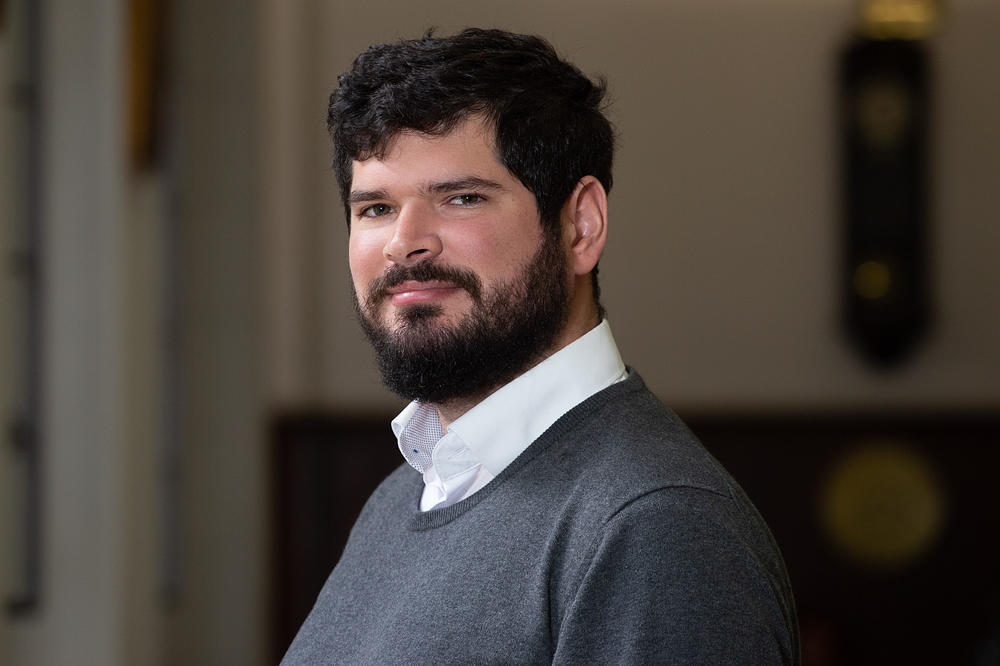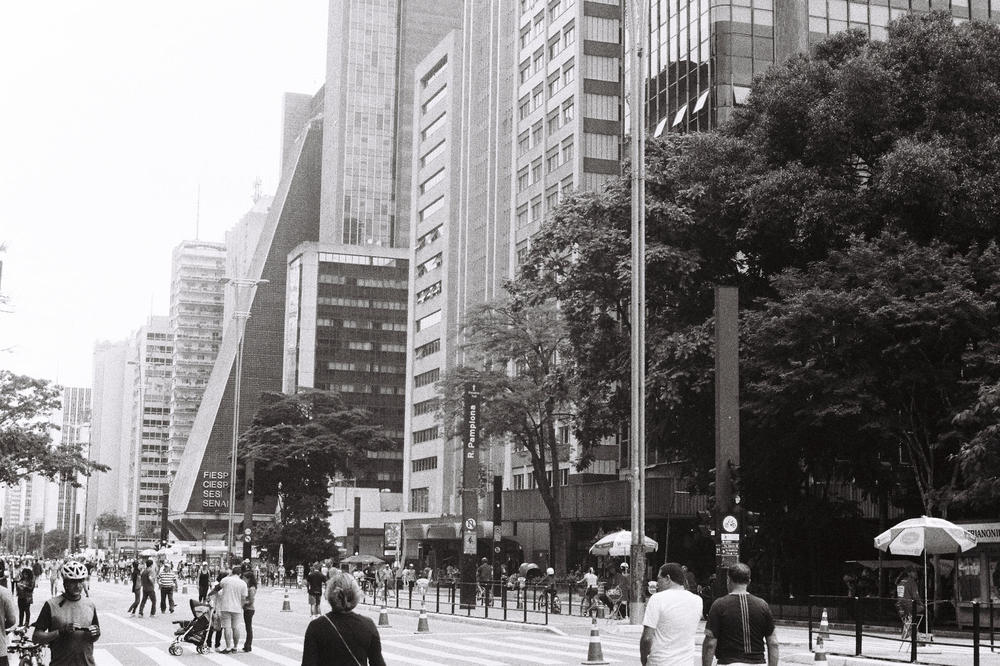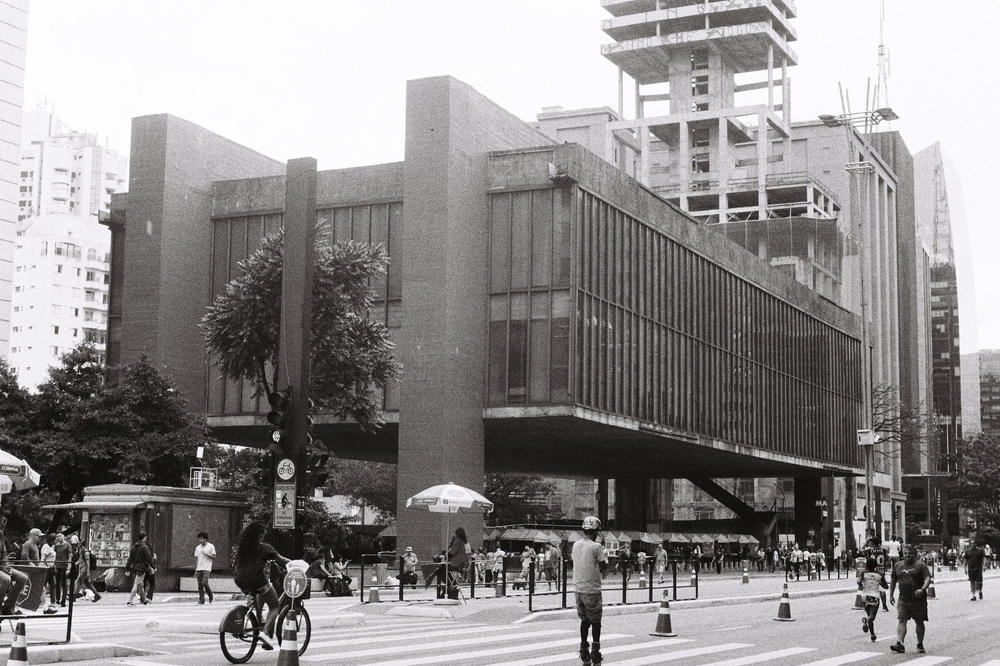Facilitating Academic and Cultural Exchange between Two Worlds
Christian Lazar is the new head of the liaison office of Freie Universität in São Paulo
Feb 26, 2021
He knows how to build bridges: Christian Lazar heads the Liaison Office of Freie Universität in São Paulo.
Image Credit: Wanezza Soares
Freie Universität maintains five international liaison offices: in Beijing, Cairo, Moscow, New Delhi, and São Paulo. They represent the university, support scholars and scientists in reaching out internationally, and set up exchange programs for education and research. Christian Lazar took over as head of the liaison office in Brazil in the middle of the coronavirus pandemic. Lazar, a 32-year-old with German and Costa Rican roots, says he is very happy to meet this challenge. “I’ve known about building bridges for a long time: I’ve moved around a lot, ever since I was a child. I’ve lived in Costa Rica, Venezuela, and Germany – and now in Brazil, in the exceptional year 2020.”
The son of a German father and a Costa Rican mother, Christian Lazar grew up bilingually with German and Spanish. While studying philosophy and Portuguese studies in Freiburg, he learned Portuguese “in order to be able to communicate within all the South American countries.” Ever since completing a master’s degree in Latin American studies with a focus on Brazil, he has felt a connection with his alma mater Freie Universität. Nevertheless, he finds it a bit “strange in a positive sense” to live in South America and still work for Freie Universität. Lazar said that he realized that he is good at “being in between.” He had already practiced intercultural communication long before he knew what it meant. As head of the liaison office, he would like to establish strong contacts between the academic landscape in South America and Freie Universität.
For the past three years, Lazar has mainly been in Brazil. First he worked at the German Consulate in Rio, then at the German Science and Innovation House in São Paulo. His experience in the region now serves him well for his work in the liaison office. He is not only aware of the current situation in the country, but also the cultural differences. Meeting deadlines at the last minute is not unusual in Brazil. Little importance is placed on using correct titles for individuals because even the relationship between CEOs and interns is often like between comrades.
São Paulo, an Economic Metropolis
“São Paulo is known as the ‘New York of the South.’ And it really is a city of superlatives,” says Lazar. The metropolis is not only gigantic, but also very diverse. “Around 1000 German companies are present in São Paulo,” he says, “and the city is home to the largest Japanese community outside of Japan. Many North Africans and countless migrants from all parts of Brazil and all of South America live here.” With a population of more than 12 million, the financial center is one of the most populous cities in the world. It is also Germany’s largest business location abroad. Freie Universität Berlin’s liaison office is located in the German Science and Innovation House, which also offices for academic organizations such as the German Academic Exchange Service (DAAD), the German Research Foundation (DFG), and the Fraunhofer Society.
According to Lazar, different cultures meet in São Paulo, including poor and rich, without spatial separation. People of different origins and different levels of wealth live side by side. The infrastructure for the numerous international companies and foreign representatives in their own industrial districts is very functional. “All the modern office buildings are on one side of the street are, right next to each other. On the other side of the street, there are only restaurants that are geared toward lunch break – it couldn’t be more pragmatic,” Lazar says with a laugh.
The Museu de Arte de São Paulo (MASP) is the most important art museum in Brazil.
Image Credit: Christian Lazar
Starting in an Exceptional Year
The new head of the liaison office actually wanted to visit Freie Universität in the fall of 2020 and introduce himself to the students and faculty in the institutes and the staff in the Executive Offices. As it turned out, a string of video calls took the place of his inaugural visit. His day-to-day work is similar: Everyone at the German Science and Innovation House has been working from home for months. At times it was almost eerie in the big city with eight-lane avenues empty of people and cars. For the month of November, the situation almost returned to normal in Brazil. The Christmas business was booming, but the covid-19 numbers were also increasing in many places.
While São Paulo’s governor at least made basic decisions to contain the coronavirus pandemic, the President of the country played down the pandemic. “In general, the situation in Brazil is very difficult because the health precautions are politically charged and the country is divided into two camps,” explains Lazar. The federal government instrumentalized fake news about the disease. “With regard to our academic cooperation, it is best to rethink long-term in order to remain sustainable,” Lazar says with certainty.
Digital Partnerships
The large local universities are very motivated to increasingly digitize student mobility with new formats such as international global classrooms. Lazar also sees a great deal of potential in this not only for the duration of the coronavirus pandemic. He says, “Digital partnerships can also be useful later in addition to actual study or research exchanges, especially when it comes to professional interest and less about getting to know the country and its people.” As a facilitator, he would like to mediate between Freie Universität and the Brazilian universities. He is also in regular contact with the heads of the university’s other liaison offices in Beijing, Cairo, Moscow, and New Delhi. Their pandemic-related situations are similar in some respects. In these regions, too, it is currently advisable only to a very limited extent to invite researchers and students from Freie Universität to come to the country. “Thinking digitally is a good option for all of us,” he says.
On the Brazilian side, there is currently great interest in going to Freie Universität for a student exchange or doing doctoral or postdoctoral research. Some scholarships were advertised, and Lazar advised his first students on the application process. He says that gives him great pleasure because he himself, supported by Freie Universität, spent a year abroad in Brazil and found a new home there.
This article originally appeared in German on November 26, 2020, in campus.leben, the online magazine of Freie Universität Berlin.



